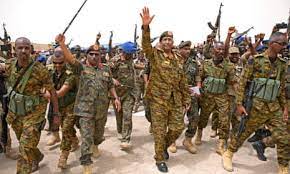

Fighting between the Sudanese army and the paramilitary Rapid Support Forces (RSF) has spread south of Khartoum towards Gezira state, endangering the lives of thousands of people who have fled there from the capital. The conflict is also intensifying in where a large rebel force, the SPLMN, that mobilised in June, has been relentlessly attacking army barracks, and in Darfur, where Arab militias backed by or affiliated to the RSF have been accused of conducting a brutal campaign of ethnic violence.
Across Sudan, school closures have affected about 20 million children. The RSF is understood to be actively recruiting older children from the southern outskirts of Khartoum, while the army has been recruiting young men and women from tribes in areas it controls in the north.
Fighting between the army and the RSF erupted on 15 April over tensions linked to a planned transition to civilian rule. Months after mediators suspended negotiations, there appears to be no clear winner and no end in sight to a war that has displaced more than 5.75 million people, killed thousands and destroyed major cities.
The RSF is now attempting to move southwards towards Gezira state, a key agricultural area and population centre. Hundreds of thousands of people, as well as some government and humanitarian functions displaced from Khartoum, have moved there. Last week, the RSF took control of Ailafoun, a large town on one of the routes to Madani.
Meanwhile, aid workers are struggling to access badly affected parts of Khartoum and Darfur, and cases of measles, malaria, dengue fever and cholera have been reported nationwide.
Everybody is losing weight, and people are struggling mentally as well,” said 29-year-old Khalid Salih from Omdurman, a city on the west bank of the Nile River, opposite Khartoum. “There are limited food items in the markets, which are closing early due to fears they’ll be bombed by the army. People are also scared of being arrested and interrogated by the RSF. It’s bleak.”
Salih said that like many other men he had remained in Omdurman to guard his family home, while women and children in his family had fled to safer parts of the country.
Aisha Abdulrahman, a 62-year-old living in the al-Haj Yousif district in the east of Khartoum, said she was still reeling from army airstrikes on her neighbourhood in late September. “I was shocked by what I saw,” she said. “They killed children who were playing football. Their bodies were cut into pieces.”
Abdulrahman, who managed to send three of her 11 children to Sudan’s western neighbour Chad, said the strikes had cut power, internet and telephone access to her neighbourhood for 10 consecutive days. She thought both the army and the RSF wanted people to leave the capital: “It feels like they want to displace us without saying it.”
The RSF now controls most of Khartoum and the army has almost no presence on the streets, with its only tactics to target RSF positions from the air and use heavy artillery from afar, which often result in heavy civilian casualties.
more recommended stories
 Somaliland’s Berbera Industrial Park: A New Era of Investment and Job Creation
Somaliland’s Berbera Industrial Park: A New Era of Investment and Job CreationThe Government of Somaliland, under the.
 President Irro’s Landmark Visit to UAE: A Diplomatic and Economic Win for Somaliland. Dubai, UAE – Somaliland’s Diplomatic Breakthrough
President Irro’s Landmark Visit to UAE: A Diplomatic and Economic Win for Somaliland. Dubai, UAE – Somaliland’s Diplomatic BreakthroughBy: Abdi Jama President Dr. Abdirahman.
 Kenya’s Unjustifiable Interference in Sudan: A Grave Violation of International Law and Regional Stability
Kenya’s Unjustifiable Interference in Sudan: A Grave Violation of International Law and Regional StabilityBy: Abdi Jama Kenya’s continued meddling.
 𝗙𝗼𝗿𝗺𝗲𝗿 𝗣𝗿𝗲𝘀𝗶𝗱𝗲𝗻𝘁 𝗠𝘂𝘀𝗲 𝗕𝗶𝗵𝗶’𝘀 𝗥𝗲𝗰𝗸𝗹𝗲𝘀𝘀 𝗔𝗰𝘁𝗶𝗼𝗻𝘀 𝗠𝘂𝘀𝘁 𝗡𝗼𝘁 𝗕𝗲 𝗜𝗴𝗻𝗼𝗿𝗲𝗱 – Abdihalim Musa
𝗙𝗼𝗿𝗺𝗲𝗿 𝗣𝗿𝗲𝘀𝗶𝗱𝗲𝗻𝘁 𝗠𝘂𝘀𝗲 𝗕𝗶𝗵𝗶’𝘀 𝗥𝗲𝗰𝗸𝗹𝗲𝘀𝘀 𝗔𝗰𝘁𝗶𝗼𝗻𝘀 𝗠𝘂𝘀𝘁 𝗡𝗼𝘁 𝗕𝗲 𝗜𝗴𝗻𝗼𝗿𝗲𝗱 – Abdihalim MusaYesterday, Somaliland witnessed a deeply troubling.

